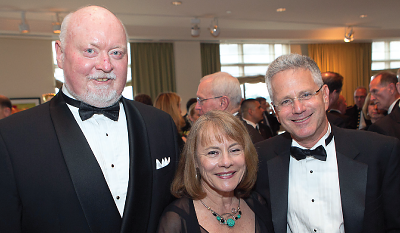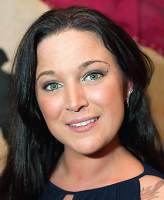APA Partners on Documentary About Challenges of Returning Troops
Abstract
APA and the American Psychiatric Foundation (APF) will join with Give an Hour to collaborate with public-television station WLIW21 in association with WNET New York Public Media to develop a documentary about the Community Blueprint program and other efforts to assist returning service members.

Attending the Give an Hour gala were (from left) Paul Burke; his wife, Peggy; and Jeffrey Borenstein, M.D.
Give an Hour is an organization that connects soldiers, veterans, and their families in need of mental health care with professionals who volunteer to provide that care. The Community Blueprint was co-founded by Give an Hour and helps localities across the United States channel civilian interest into practical ways of addressing common challenges facing veterans, returning service members, and their families.
“The documentary will tell the story of the Community Blueprint and other initiatives under way to support those who serve and their families,” Psychiatric News Editor-in-Chief Jeffrey Borenstein, M.D., told hundreds of guests at a May 23 fundraising dinner for Give an Hour in Washington, D.C. “It will explore the complex reintegration issues facing our returning service members and their families.” Borenstein hosts the public-television series “Healthy Minds.”
The plan for the documentary is a continuation of a relationship between Give an Hour and APF, which has helped produce public-service announcements for the nonprofit organization.
“We are extremely proud of APF’s four-year partnership with Give an Hour and look forward to continued success,” said Paul Burke, executive director of the APF.
At the gala, two service members— Jennifer Crane (see How Give an Hour Can Change Lives) and Justin Constantine—spoke of their experiences in Iraq and Afghanistan and how Give an Hour helped them recover from wounds they suffered, both visible and invisible.
Marine Corps Reserve Maj. Justin Constantine, an attorney, was serving on a civil-affairs team in Iraq when he was shot in the head by a sniper. He has undergone numerous surgeries to repair his face and mouth.
But there were other consequences of the sniper’s bullet as well: posttraumatic stress disorder, nightmares and other sleep problems, anger, and drinking.
Give an Hour connected Constantine with psychologist Rolando Diaz, Ph.D., of Arlington, Va. He now sees Diaz twice a month, in addition to receiving medical care in the VA system.
“I feel comfortable talking with him,” Constantine said. “He’s knowledgeable, and he uses language I understand.”
Constantine married after his return from Iraq and now works as an attorney on an FBI counterterrorism team. He will soon retire from the Marines following a promotion to lieutenant colonel.
At the gala, Give an Hour President Barbara Van Dahlen, Ph.D., reported that since 2005, mental health clinicians under its aegis have contributed more than 50,000 hours of professional time, worth $5 million.
“We’re asking those with something to give to get up and give it,” said Van Dahlen, a clinical psychologist.
Jean Case, President and CEO of the Case Foundation and also an honoree, praised the therapists who had volunteered for Give an Hour.
“You are amazing,” she said. “Even one hour a week adds up to a big thing.”
Case announced that Give an Hour had recently been appointed a certifying organization for a special presidential volunteer service award granted to those who had contributed at least 100 hours of volunteer service to returning troops.
Three Give an Hour volunteer therapists received awards that evening: Jeanine Aversa, M.A., L.P.C., of Exton, Pa.; Brenna Chirby, Psy.D., of McLean, Va.; and Diaz. 
To watch a video interview with Barbara Van Dahlen and Jennifer Crane, go to www.wliw.org/productions/local/healthy-minds/ptsd-helping-our-troops-109/176/.
How Give an Hour Can Change Lives
Jennifer Crane’s first day of Army basic training was September 11, 2001. Within a few months, she found herself in Afghanistan as a paralegal in a judge advocate general unit.

Jennifer Crane
After her return to the United States, she experienced nightmares and flashbacks and began using illegal drugs to self-medicate. After an arrest, she entered a drug-court program and began to get help for her posttraumatic stress disorder from therapist Jeanine Aversa, M.A., L.P.C., of Exton, Pa.
Aversa, who did an internship at the Coatesville, Pa., VA Medical Center, devotes 10 percent of her practice to pro-bono services for clients from the armed forces, their families, or 9/11 first responders, often with people referred through Give an Hour.
“That’s what I wanted to do,” she told Psychiatric News. “We have a large underserved population that needs help.”
She tells people like Crane: “If you want treatment to make your life, yourself, your family better, there’s an organization that can help.”
That organization is Give an Hour, which helps current and former service members and their families find psychotherapeutic help. Mental health therapists of all kinds who join Give an Hour agree to contribute at least one hour of professional time per week to this population. Service members and their families seek their help either because it is unavailable through regular military or Veterans Affairs health systems (as is the case for some family members) or because service members feel stigmatized if they seek usual sources of care.
Crane was initially resistant to her court-mandated treatment, but when she got pregnant, had no insurance, and needed to go off medications, Aversa helped her make the decision to do so.
“I’m about overcoming barriers,” Aversa said. “If [clients] are resistant, then I just haven’t figured out how to say it so they can hear it.”
Aversa’s advice for other mental health clinicians: “If you’re not giving your time, you should be.”



